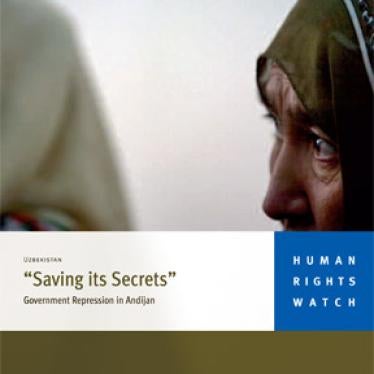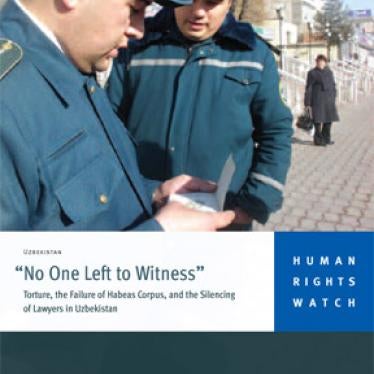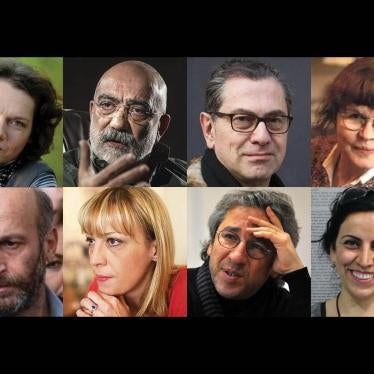(Berlin) – The European Union and the United States should re-examine their relationships with the Uzbek government in light of its atrocious rights record, Human Rights Watch said today on the eve of the seventh anniversary of the government massacre at Andijan, Uzbekistan. Both the EU and the US have been enhancing their relationships with the Uzbek government.
“Seven years later, the EU and the US have yet to hold the Uzbek government accountable for the Andijan massacre and for the repression that continues unabated to this day,” said Hugh Williamson, Europe and Central Asia director at Human Rights Watch. “Uzbekistan’s partners should recognize the downward spiral in its human rights record since Andijan and reiterate calls for justice for this terrible atrocity.”
On May 13, 2005, hundreds of largely peaceful protesters were killed by Uzbek government forces indiscriminately and without warning. No one has been held accountable for the killings, nor has the Uzbek government ceased its relentless persecution of those it suspects of having ties to the protest and of human rights activists and others critical of the government.
The massacre, the Uzbek government’s refusal to allow an international investigation, and the ensuing crackdown led the EU to impose sanctions in October 2005 and to establish human rights criteria for the Uzbek government. The Uzbek government has not met those criteria, Human Rights Watch said. But the EU gradually eased the sanctions and in 2009 lifted them completely.
The EU overall is deepening its engagement in Uzbekistan. In January 2011, the European Commission president, Jose Manuel Barroso, received the Uzbek president, Islam Karimov, in Brussels and the EU has opened an EU delegation in Tashkent.
The EU’s readiness to deepen its relationship with Uzbekistan without requiring human rights improvements contrasts with its recent rethinking of its relationships with autocratic governments in the Middle East, Human Rights Watch said. In March 2011, Štefan Füle, the European commissioner for enlargement and the EU’s neighborhood policy, told the European Parliament that “too many of us fell prey to the assumption that authoritarian regimes were a guarantee of stability in the region.” He said the EU should be on the side of people striving to promote European values.
As a condition for deeper engagement with the Uzbek government, the EU should insist that it fulfill the human rights criteria attached to the EU’s post-Andijan sanctions, Human Rights Watch said. It also should release all imprisoned human rights defenders and political prisoners; allow unimpeded operation of nongovernmental organizations in the country; cooperate fully with all relevant UN human rights experts monitoring various human rights issues; guarantee freedom of speech and of the media; implement the conventions against child labor; and fully align its election processes with Organization for Security and Co-operation in Europe (OSCE) standards.
The United States is also pursuing a policy of re-engagement with Uzbekistan. Congress has expressly restricted assistance to Uzbekistan based on its deplorable human rights record and further tightened those restrictions following the Andijan massacre. But in a controversial move in September, the Obama administration sought to re-start assistance and to provide direct military aid, also known as Foreign Military Financing (FMF), to Uzbekistan in 2012. News media reports following the move quoted Secretary of State Hillary Clinton as saying that Uzbekistan was “showing signs of improving its human rights record and expanding political freedoms.”
“Claims of progress in Uzbekistan’s human rights record are simply not credible,” Williamson said. “From continuing prosecutions of journalists to religious persecution to the practice of forced child labor in the cotton sector, the Uzbek government has seemingly hardened its resolve to violate basic rights. Undue praise from the West will not encourage better behavior; only meaningful policy consequences will.”
Uzbekistan is seen as a critical stop in the Northern Distribution Network, through which the United States has sent non-lethal supplies to Afghanistan since 2009, as an alternative to what are viewed as unstable supply lines through Pakistan. Uzbekistan expelled the United States from the Karshi-Khanabad base in July 2005, just after refugees from Andijan were airlifted from Kyrgyzstan to Romania with US assistance.
A US visa ban on Uzbek officials went into effect in summer 2008, and restrictions on foreign assistance remain in place. But it is not clear what steps the administration has taken to promote implementation of the human rights benchmarks attached to the legislation as part of its dialogue with the Uzbek government. The benchmarks include investigating and prosecuting those responsible for the Andijan massacre, establishing a genuine multi-party system, and ensuring freedom of expression.
“Washington, Brussels, and Berlin should not allow Uzbekistan’s standing as a strategic partner to distort reality about the government’s deplorable record,” Williamson said. “The seventh anniversary of the Andijan massacre is an opportunity for them to set the record straight and underscore Tashkent’s urgent need to end rights violations.”
While relations between Uzbekistan and its Western partners have essentially normalized, there is no evidence of improvements in Uzbekistan’s human rights record or any sign of political will to address the rampant human rights abuses in Uzbekistan.
Details about human rights abuses in Uzbekistan and background on the Andijan massacre follow.
Uzbekistan’s Atrocious Human Rights Record
Uzbekistan’s overall human rights record is abysmal. Torture and ill-treatment are used systematically in places of detention to coerce confessions. Muslims who practice their faith outside state controls are persecuted, with hundreds convicted on religious extremism charges every year, and many others re-tried on spurious prison violation charges to keep them incarcerated years after their original sentences are complete.
At least 10 human rights defenders, and numerous independent journalists and opposition activists are in prison in Uzbekistan in retaliation for their work or criticism of the government, Human Rights Watch said. In recent months, the Uzbek government has widened its crackdown on independent civil society, prosecuting rights activists and independent journalists on trumped-up charges, such as fraud or defamation. The government has arbitrarily detained and harassed those at liberty who have attempted peacefully to exercise their right to freedom of assembly.
In its increasing crackdown on activists and journalists, Uzbek authorities, in March, deported two well-known international journalists, the BBC’s Natalia Antelava and Viktoriya Ivleva of Russia’s Novaya Gazeta, when they arrived at Tashkent international airport, attempting to visit the country. On February 8, the government-controlled bar association upheld a lower commission’s ruling to disbar one of the country’s leading human rights lawyers, Ruhiddin Komilov.
At the end of January, just days before his 13-year prison sentence was set to expire, Muhammad Bekjanov, former editor of the political opposition newspaper Erk, was given an additional five-year sentence for alleged violations of internal prison rules. Bekjanov has been jailed since 1999, and along with another jailed journalist, Yusuf Ruzimuradov, has been imprisoned longer than any other reporter worldwide, according to the Committee to Protect Journalists.
Habeas corpus (judicial review of detention), which the Uzbek government claims is indication of an improvement in its rights record, fails to protect detainees against torture. The legal standard is weak, habeas hearings are closed proceedings and judges approve requests by prosecutors to arrest defendants in nearly every case. Judges also routinely ignore torture allegations.
In its December 2011 report “‘No One Left to Witness’: Torture, the Failure of Habeas Corpus, and the Silencing of Lawyers in Uzbekistan,” Human Rights Watch presented rare first-hand evidence of wide-scale human rights abuses in the isolated country, from which UN human rights experts have been banned for almost a decade. Human Rights Watch documented cases in which authorities poured boiling water on an activist, hung detainees by their wrists and ankles, subjected them to rape and sexual humiliation, and asphyxiated them with plastic bags and gas masks.
Human rights defenders in prison for no reason other than their legitimate human rights work include: Solijon Abdurakhmanov, Azam Formonov, Nosim Isakov, Gaibullo Jalilov, Rasul Khudainasarov, Ganihon Mamatkhanov, Habibulla Okpulatov, Yuldash Rasulov, Dilmurod Saidov, and Akzam Turgunov. Several are in serious ill-health and at least seven have suffered torture or ill-treatment in prison. Another activist, Jamshid Karimov, was reported to have been released in 2011, but is missing, prompting fears that authorities may have detained him or otherwise restricted his movements.
The government refuses to allow domestic and international organizations to operate in Uzbekistan without interference. In March 2011, Uzbek authorities forced Human Rights Watch to close its Tashkent officeby persistently preventing HRW staff from receiving visas and accreditation over many years.
The Uzbek government’s record of cooperation with international bodies, in particular the United Nations, remains very poor. It has refused repeated requests by eight UN human rights experts for access to the country: the special rapporteurs on torture; on the situation of human rights defenders; on freedom of religion; on violence against women; on the independence of judges and lawyers; on extrajudicial, summary or arbitrary executions; on contemporary forms of slavery; and the working group on arbitrary detention. It has also failed to implement recommendations from a range of UN expert bodies, such as the Committee Against Torture, the Human Rights Committee, and the special rapporteur on torture.
Widespread use of government-sponsored forced labor, including child labor, to collect the annual cotton harvest is a pervasive human rights concern in Uzbekistan. There is no evidence that the government has taken any meaningful steps to implement International Labor Organization (ILO) Conventions on the Elimination of the Worst Forms of Child Labor (Convention No. 182) or on the Minimum Age of Employment (Convention No. 138), which it ratified in March 2008, though the government adopted a National Action Plan in 2008 and introduced legislative amendments in December 2009. The Uzbek government has rebuffed ILO requests to gain access for its independent monitors to visit Uzbekistan to assess the extent of its compliance with the international obligations it has undertaken.
The Andijan Massacre
Andijan: May 13, 2005
On the morning of May 13, 2005, gunmen broke into Andijan’s prison to release 23 local businessmen who were on trial for “religious extremism” and attacked several government buildings in Andijan. Hours later, thousands of people gathered on the square to vent grievances about poverty and government repression. Although a small group of gunmen were on the square, the overwhelming majority of demonstrators were unarmed.
Later in the day, Uzbek security forces indiscriminately shot into the crowd from armored personnel carriers (APCs) and sniper positions above the square. Toward evening, government troops blocked off the square and then, without warning, opened fire, killing and wounding hundreds of unarmed civilians. As they tried to escape, hundreds of people were shot by snipers or mowed down by troops firing from APCs. After the peak of the carnage, government forces swept through the area and executed some of the wounded where they lay.
Government agents made no apparent effort to limit the use of lethal force to situations where it was strictly unavoidable to protect lives, as required by international law. The United Nations and other intergovernmental organizations found that the government had used lethal force excessively.
The Uzbek government has refused to allow an independent inquiry into the massacre and denies responsibility for the killings of the unarmed protesters. However, President Islam Karimov was among those most vocal in calling for an independent international inquiry into the June 2010 ethnic violence in southern Kyrgyzstan, which included attacks on ethnic Uzbeks.
The government put the Andijan death toll at 187, acknowledging only approximately 60 protester deaths, and attributing all of those to gunmen in the crowd, not to government forces. The real number of civilian deaths is estimated to be several times the official number.
Furthermore, Uzbek authorities suppressed and manipulated information about the massacre and arrested hundreds of the demonstrators and witnesses to the violence. Human Rights Watch documented the stories of many of these men and women, who were arbitrarily detained and tortured or otherwise ill-treated. Between September 2005 and July 2006, at least 303 people were convicted and sentenced to lengthy prison terms in 22 trials, all but one closed to the public. The government continues to seek out those whom it considers linked to the massacre.
Aftermath
Immediately following the Andijan massacre, the Uzbek government unleashed a fierce crackdown on human rights defenders, independent journalists, political activists, and civil society groups. Dozens of activists were imprisoned and others fled the country, fearing persecution. Uzbek authorities have maintained this ruthless campaign against all forms of dissent.
In the years since the massacre, Human Rights Watch has repeatedly received credible reports that local authorities intimidate and harass the families of Andijan refugees, summoning them for questioning, placing them under surveillance and pressuring them to convince their relatives to return to Uzbekistan. Uzbek authorities have persisted in persecuting anyone they suspect of having ties to the 2005 Andijan protest.
In a stark example, Diloram Abdukodirova, a refugee who fled Andijan in 2005, returned to Uzbekistan in January 2010 to be with her children after assurances to her family that she would not be harmed. She was detained upon her arrival, held for four days, and then temporarily released but taken into custody again in March. On April 30, 2010, she was convicted on charges of illegal border crossing and anti-constitutional activity and sentenced to 10 years and 2 months in prison. According to a family member, Abdukodirova appeared at one court hearing with a bruised face, raising concern that she had been ill-treated in custody.
EU Sanctions
On October 3, 2005, the EU imposed sanctions on Uzbekistan – which included a partial suspension of the EU-Uzbekistan Partnership and Cooperation Agreement, a visa ban on 12 government officials considered responsible for the massacre and/or the ensuing cover-up and crackdown, and an embargo on arms exports to Uzbekistan. The sanctions were accompanied by criteria set by the EU for reviewing its sanctions policy vis-à-vis Uzbekistan.
Beginning in 2006, despite the Uzbek government’s failure to take any concrete steps to meet the criteria, the EU began weakening the sanctions. In 2006, it re-instated the Partnership and Cooperation Agreement; in 2007, it suspended the visa ban; and in October 2009, it lifted the arms embargo – the last remaining, and largely symbolic, portion of the sanctions policy. Furthermore, starting in 2007, the EU dropped the call for an international investigation into the Andijan massacre from the sanctions criteria.








